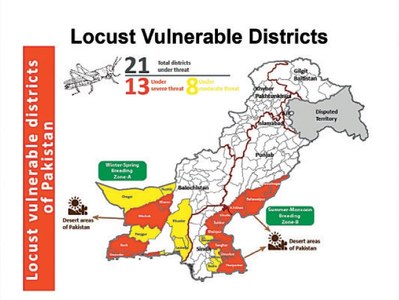ISLAMABAD: The number of locusts could grow twenty-fold in the coming rainy season in South Asia unless extra measures to counter the swarms are put in place the Food and Agriculture Organisation (FAO) of the United Nations has warned.
According to FAO experts, a single swarm of desert locust can cover an entire square kilometre and contain some 80 million insects.
Swarms of desert locust, which originated in Africa, have moved swiftly into West Asia, attacking vegetation in parts of Iran and Pakistan and are now threatening crops in India. These swarms are the worst experienced in more than a generation, experts say.
At the same time, fall armyworm, a maize-destroying pest that migrated to Asia from Africa in 2018, has also spread across the continent and has arrived in Australia.
Infestation confirmed in all provinces, pest control operation underway
The FAO is concerned that while the world fights to slow the spread of Covid-19, the worst pandemic experienced in a century, countries in South Asia are simultaneously responding to plagues of locusts, cyclones and a deadly livestock disease, all of which threaten to worsen hunger and the livelihoods of millions of people.
Meanwhile, the joint teams of the Ministry of National Food Security and Research, Pakistan Army and provincial agricultural departments continues to carry out comprehensive control operation, and so far about 24 million hectares have been surveyed, while 496,700 hectares of land have been controlled.
According to an update released by the National Locust Control Centre on Monday, an area of 108,647 hectares was surveyed in Punjab and after the presence of locusts was confirmed in the districts of Mianwali and Dera Ghazi Khan, and anti-locust operations were carried out in 116 hectares area during past twenty-four hours.
More than 2,100 people and more than 200 vehicles took part in the operation. So far 7,936,384 hectare area has been surveyed in 36 districts of the province and 173,936 hectare area has been operated.
In the last 24 hours, an area of 73,462 hectares has been surveyed in Sindh and locust infestation has been confirmed in the districts of Naushahro Feroze, Jamshoro, Dadu, Shaheed Benazirabad, Kashmore, Khairpur and Shikarpur.
The operation involved 35 teams of 387 people including Pakistan Army and more than 60 vehicles. So far 3,126,604 hectare area has been surveyed and 38,672 hectare area has been operated across the province.
In Khyber Pakhtunkhwa, an area of 74,125 hectares was surveyed in the last 24 hours and the presence of locusts was confirmed in nine districts including Dera IsmaiI Khan, Tank, South Waziristan, North Waziristan, Lakki Marwat, Karak, Karam, Orakzai and Khyber.
An anti-locust operation was carried out in 974 hectare area, which involved 80 teams of more than 900 people including Pakistan Army, and more than 100 vehicles. So far 326,4629 hectare area has been surveyed and 40,337 hectare area has been operated across the province.
In the last 24 hours, 115,249 hectare area was surveyed in Balochistan province and 33 districts including Khuzdar, Awaran, Noshki, Chaghi, Gwadar, Lasbela, Ketch, Panjgur, Kharan, Washik, Quetta, Barkhan, Dera Bugti, Daki, Harnai and Jaffarabad were surveyed.
More than 1,200 people and more than 100 vehicles took part in the operation. So far 8,895,914 hectare area has been surveyed and 281,372 hectare area has been operated in Balochistan.
Aerial spraying is also being done with the help of Army, Department of Plant Protection and National Disaster Management Authority for effective control of locust. In addition, non-conventional methods are also being used.
Published in Dawn, June 2nd, 2020
















































